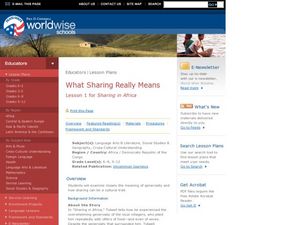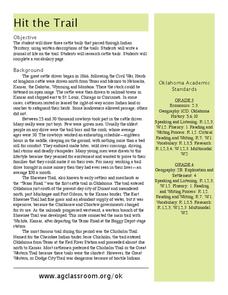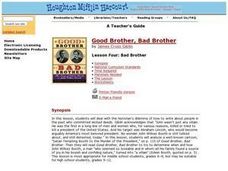Curated OER
Breaching the Gulf Between Cultures
Pupils explore the dynamics, the challenges, and the rewards of adjusting to a new culture through the reading of "Help! My Father is Coming" and "The Visit to Vijay's". In this social culture lesson plan, students carousel brainstorm...
Curated OER
Encountering Very Different Ways of Life
Students explore the concept of crossing cultures through reading the stories "Help! My Father is Coming!" and "The Visit to Vijay's." In this culture instructional activity, students predict what will happen next in the stories....
Curated OER
What Sharing Really Means
Students examine the meaning of generosity and how sharing can be a cultural trait. In this cultural trait lesson, students read a text about the culture of generosity in Africa. Students complete a discussion activity and journal activity.
Curated OER
Literary Response and Analysis
Examine a variety of literary responses to Abraham Lincoln's death and the impact of perception. Your class can work in writing groups to analyze either poetry, eulogy, or a newspaper article. They retell the events of Abraham Lincoln's...
Curated OER
Lesson 1: Faulkner's The Sound and the Fury
I love Faulkner, his experimental style and stream of consciousness are so exciting. Your learners can analyze William Faulkner and his novel, The Sound and the Fury by defining his place in American literary history and exploring...
Curated OER
Hit the Trail
Students read about the history of cattle trails and complete language arts, math, social studies, and more activities about barbed wire. In this barbed wire lesson plan, students read poetry, research changes over time, draw cattle...
Curated OER
The Talking Goat
Students read and analyze an African folktale. They read and discuss the folktale, analyze a map of Africa and Liberia, complete a worksheet, answer discussion questions, and analyze the patterns and analogies of the folktale.
Curated OER
Abolitionists in U.S. History
Young scholars read and discuss excerpts from the writings of Henry David Thoreau, Frederick Douglass and Sarah Parker Redmond. They compare and contrast the views of the three abolitionists concentrating on the experiences and reasons...
Curated OER
On the Other Side of the Color Barrier: Segregation and the Negro Leagues
Students study segregation that occurred in the past and that is currently occurring. In this equal rights lesson, students use primary source documents to student segregation of the past. In a culminating activity, students find or draw...
Curated OER
Global Eyes
Twelfth graders consider global issues and their effects. They identify the themes of human needs, human rights, and the environment, select a topic and research articles for a Global Current Events Portfolio. Working in small groups,...
Curated OER
Environmental Destruction in Vietnam
Students watch video clip on Environmental Destruction of Vietnam, select and discuss passages from essay, Resuscitation of the Dead Earth, that emphasize destruction to the land, and write essay on whether United States should have been...
Curated OER
Mastering the Document-Based Essay Question
Students use a primary source document from the Civil War period of history in order to derive meaning for an essay question. The essay is based completely on the document with no other research to support the content.
Middle Tennessee State University
John Brown: Hero or Villain?
"Love it or leave it." "You're either for us or against us." Rhetoric and it's polarizing effects are the focus of a lesson that uses John Brown's attack on Harper's Ferry as an exemplar. Groups examine primary source documents,...
West Virginia Department of Education
Editorials: The Guiding Voice of Authority?
How much can opinion influence a news story? A standalone resource discusses the importance of John Brown's Raid through the lens of journalism. Learners analyze two different texts, one from the perspective of the North and the other of...
West Virginia Department of Education
Harpers Ferry Letters
Scholars write letters as if they were someone who heard the story of John Brown's raid. The resource, a standalone, covers information from primary sources that is important to West Virginian history: the Harpers Ferry Letters.
Curated OER
Jackie Steals Home
Students read articles relating to Jackie Robinson's breaking of the racial barrier in professional baseball. This leads to a deeper exploration of racism in the United States. They use a variety of worksheets imbedded in this plan to...
Curated OER
Bad Brother
Students deal with the historian's dilemma of how to write about people in the past who committed wicked deeds. They analyze a well-known cartoon, "Satan Tempting Booth to the Murder of the President."
Curated OER
The Secret to Freedom Teacher’s Guide
Learners read the story "The Secret to Freedom" and participate in active reading to personalize what they have read. In this reading lesson, students follow several writing activities and discuss their work . Learners integrate...
Curated OER
Lift Every Voice and Sing
Students analyze sculpture, poetry, and music to gain an understanding of historical events. In this critical thinking skills lesson, students take a closer look at African-American history as they examine "Lift Every Voice and Sing'"...
Curated OER
Travel Through Time with a Family Member
Students interview a family member. In this interviewing lesson, students choose a family member to interview and write about. Students create a PowerPoint about the person including a timeline, photographs, and a narrative about their...
Curated OER
Northern and Southern Differences in 1856
Fourth graders investigate differences between the ideology of the Northern and Southern states in 1856. In this states' history lesson, 4th graders examine the needs for slaves in the Southern agricultural economy, and compare it to the...
Curated OER
Westward Expansion and the Frontier
Students explore U.S. history by researching a historic map. In this westward expansion lesson, students discuss the mystery of the western U.S. in the early 1800's and the impact expansion had on Native Americans and agriculture....
Curated OER
Abraham Lincoln
In this biography worksheet, students read a one page factual story about Abraham Lincoln. Students then answer 7 questions about the story.
Curated OER
A Picture is Worth a Thousand Words: Public Views of Lincoln
Students write a letter in the voice of Abraham Lincoln. In this history instructional activity, students interpret the way the public viewed Lincoln during various times by examining political cartoons and images. Students write a...

























